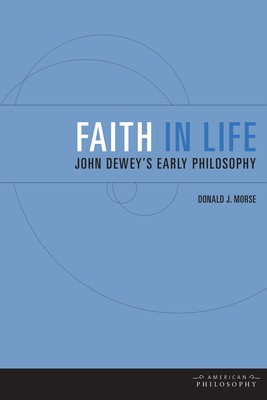
- We will send in 10–14 business days.
- Author: Donald J Morse
- Publisher: Fordham University Press
- ISBN-10: 0823287068
- ISBN-13: 9780823287062
- Format: 15.2 x 22.9 x 1.9 cm, softcover
- Language: English
- SAVE -10% with code: EXTRA
Reviews
Description
This is the first book to consider John Dewey's early philosophy on its own terms and to explicate its key ideas. It does so through the fullest treatment to date of his youthful masterwork, the Psychology.
This fuller treatment reveals that the received view, which sees Dewey's early philosophy as unimportant in its own right, is deeply mistaken. In fact, Dewey's early philosophy amounts to an important new form of idealism. More specifically, Dewey's idealism contains a new logic of rupture, which allows us to achieve four things: - A focus on discontinuity that challenges all naturalistic views, including Dewey's own later view;- A space of critical resistance to events that is at the same time the source of ideals;
- A faith in the development of ideals that challenges pessimists like Schopenhauer and Nietzsche; and
- A non-traditional reading of Hegel that invites comparison with cutting-edge Continental philosophers, such as Adorno, Derrida, and Zizek, and even goes beyond them in its systematic approach; In making these discoveries, the author forges a new link between American and European philosophy, showing how they share similar insights and concerns. He also provides an original assessment of Dewey's relationship to his teacher, George Sylvester Morris, and to other important thinkers of the day, giving us a fresh picture of John Dewey, the man and the philosopher, in the early years of his career. Readers will find a wide range of topics discussed, from Dewey's early reflections on Kant and Hegel to the nature of beauty, courage, sympathy, hatred, love, and even death and despair. This is a book for anyone interested in the thought of John Dewey, American pragmatism, Continental Philosophy, or a new idealism appearing on the scene. Faith in Life: John Dewey's Early Philosophy is available from the publisher on an open-access basis.
EXTRA 10 % discount with code: EXTRA
The promotion ends in 17d.19:54:50
The discount code is valid when purchasing from 10 €. Discounts do not stack.
- Author: Donald J Morse
- Publisher: Fordham University Press
- ISBN-10: 0823287068
- ISBN-13: 9780823287062
- Format: 15.2 x 22.9 x 1.9 cm, softcover
- Language: English English
This is the first book to consider John Dewey's early philosophy on its own terms and to explicate its key ideas. It does so through the fullest treatment to date of his youthful masterwork, the Psychology.
This fuller treatment reveals that the received view, which sees Dewey's early philosophy as unimportant in its own right, is deeply mistaken. In fact, Dewey's early philosophy amounts to an important new form of idealism. More specifically, Dewey's idealism contains a new logic of rupture, which allows us to achieve four things: - A focus on discontinuity that challenges all naturalistic views, including Dewey's own later view;- A space of critical resistance to events that is at the same time the source of ideals;
- A faith in the development of ideals that challenges pessimists like Schopenhauer and Nietzsche; and
- A non-traditional reading of Hegel that invites comparison with cutting-edge Continental philosophers, such as Adorno, Derrida, and Zizek, and even goes beyond them in its systematic approach; In making these discoveries, the author forges a new link between American and European philosophy, showing how they share similar insights and concerns. He also provides an original assessment of Dewey's relationship to his teacher, George Sylvester Morris, and to other important thinkers of the day, giving us a fresh picture of John Dewey, the man and the philosopher, in the early years of his career. Readers will find a wide range of topics discussed, from Dewey's early reflections on Kant and Hegel to the nature of beauty, courage, sympathy, hatred, love, and even death and despair. This is a book for anyone interested in the thought of John Dewey, American pragmatism, Continental Philosophy, or a new idealism appearing on the scene. Faith in Life: John Dewey's Early Philosophy is available from the publisher on an open-access basis.


Reviews